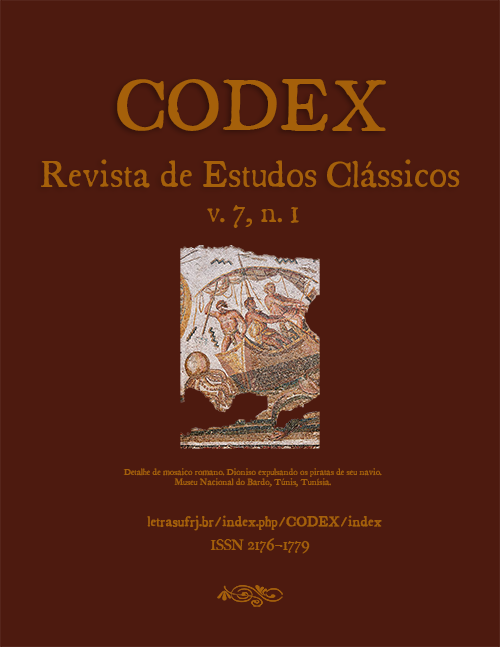Inimicissimi atque immanissimi: the Gauls in Cicero’s Pro Fonteio
DOI:
https://doi.org/10.25187/codex.v7i1.20894Keywords:
Cicero, Pro Fonteio, Gauls, rhetoric, alterityAbstract
In his speech Pro Fonteio, of 69 BCE, Cicero has defended Fonteius, who was the propretor in Gaul and was accused by the local inhabitants (the allobroges) of bad administrating the province. It is important to keep in mind that, in a legal context, Cicero had a clear purpose in his speaking to the court, which was to accuse or to defend someone. With this objective, the argumentation that Cicero presented to his audience was, essentially, a verbal construction that he was free to manipulate in the best way he would like, so he could persuade and convince his public of his statements. This paper aims to discuss how Cicero has defended Fonteius by constructing his argumentation on the Gauls’ characterization as the biggest and most cruel enemies of Rome. Therefore, there is an analysis of some parts of the speech, concerning the argumentative pictures and the vocabulary applied by the Latin orator to make that unfavorable portrait of the Gaul nation of the allobroges.
References
ANDRÉ, Jean-Marie; HUS, Alain. L’Histoire à Rome: historiens et biographes dans la littérature latine. [s.l.]: Presses Universitaires de France, 1974.
BOARDMAN, John; GRIFFIN, Jasper; MURRAY, Oswyn (eds.). The Oxford History of the Classical World. Oxford: Oxford University Press, 1986.
BORCA, Federico. Luoghi, corpi, costumi: determinismo ambientale ed etnografia antica. Roma: Edizione di Storia e Letteratura, 2003.
CÍCERO. As Catilinárias. Introdução, tradução do latim e notas de Sebastião Tavares de Pinho. Lisboa: Edições 70, 1990.
CICÉRON, M. T. De la divination. Introduction de Amin Maalouf, traduit par Gérard Freyburger e John Scheid. Paris: Les Belles Lettres, 1992.
______________. Discours: Catilinaires. Texte établi par H. Bornecque et traduit par E. Bailly. Paris: Les Belles Lettres, 1926, tome X.
_____________. Discours: pour M. Fonteio , pour A. Cécina , sur les pouvoirs de Pompée. Texte établi et traduit par André Boulanger. Paris: Les Belles Lettres, 1961, tome VII.
______________. Discours: Seconde action contre Verrès, livre II: La Préture de Sicile. Texte établi et traduit par H. de La Ville de Mirmont. Paris: Les Belles Lettres, 1936, tome III.
______________. Discursos: En defensa de Sexto Roscio Amerino; En defesa de la ley Manilia; En defensa de Aulo Cluencio; Catilinarias; En defensa de Lucio Murena. Traducciones, introducciones y notas de Jesús Aspa Cereza. Madrid: Gredos, 1995.
______________. Discursos: Verrinas. Traducción y notas de José María Requejo Prieto. Madrid: Gredos, 1990, 2 v.
CONTE, Gian Biagio. Latin Literature: a history. Trad. Joseph B. Solodow. Baltimore: Johns Hopkins University Press, 1999.
GLARE, P.G.W.(ed.). Oxford Latin dictionary. Oxford: Claredon Press, 1982.
GRUEN, Erich S. Culture and national identity in Republican Rome. Ithaca: Cornell University Press, 1992.
_______________. Greeks and non-Greeks. In: BUGH, Glenn R. (ed.). The Cambridge Companion to the Hellenistic world. Cambridge: Cambridge University Press, 2006, p. 295-314.
______________. Rethinking the other in Antiquity. Oxford: Princeton University Press, 2011.
HIPÓCRATES. Ares, Águas e Lugares. In: CAIRUS, Henrique F.; RIBEIRO JR., Wilson A. Textos hipocráticos: o doente, o médico e a doença. Rio de Janeiro: Fiocruz, 2005, p. 91-129.
MOMIGLIANO, Arnaldo. Os limites da helenização. Rio de Janeiro: Jorge Zahar, 1991.
SARAIVA, F.R. dos Santos; QUICHERAT, L. Novíssimo dicionário latino-português. Rio de Janeiro: Garnier, 2003.
VASALY, Ann. Representations: images of the world in Ciceronian oratory. Los Angeles: University of California Press, 1993.
WELLS, Peter S. The Barbarians speak: how the conquered peoples shaped Roman Europe. Princeton: Princeton University Press, 1999.
Downloads
Published
How to Cite
Issue
Section
License
This work is licensed under a Creative Commons Attribution-NonCommercial 4.0 International License.










